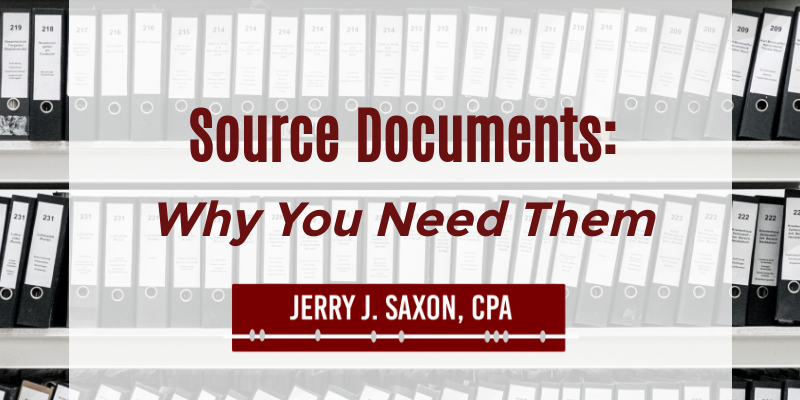
Source Documents: Why You Need Them
Keeping your business’ source documents is a must for all businesses. Examples of source documents include sales, payroll, canceled checks and much more. These documents support your bookkeeping transactions. Source documents will help you prove the legitimacy of your books if the IRS were to select your business for an audit.
For a source document to be valid it must contain at least majority or all of the following information:
• Why the transaction was made
• Who was involved in the transaction
• Date it occurred
• Dollar amount of the transaction
Luckily, the IRS accepts digital copies of source documents, which can help eliminate the need of having rows of file cabinets. The IRS does suggest keeping copies of source documents a minimum of seven years to infinite time. At any given time, the IRS has the power to audit your business for any given year. Since we do live in the digital age it is much easier to keep those documents with minimal physical space.
Keeping your expenses and books well documented can truly help you out in the long run. By having everything organized it is easier to create yearly reports that can help create a great financial record for your business. I would suggest keeping your source documents, tax return, assets and liabilities, profit and loss statements organized together by year. Not only will this help if you are audited for a particular year, but if you ever think about merging or selling your business your income information is at an arm’s reach. Potential buyers will want to see your yearly books to create their own financial forecast.
The more detailed you are in keeping your receipts the better job your accountant can do in keeping your books in order. It is better to have more saved documents than miss one important receipt. Your accountant will be able to get rid of the documents you don’t need but they will not be able to create the ones you are missing.
If you have any questions, you can give me a call at 405-604-3013.

The Must-Have STARTUP To-Do List
ASK THE TOUGH QUESTIONS
Would you buy your product/service?
Will you make a profit at the price?
Are you solving a problem?
What makes you different from the competition?
JOT DOWN THE GAME PLAN
Do you have enough funds for first-year living expenses?
Grants/ Loans/Financing?
Do you have a clever Business Name?
Register the domain name/email address.
Figure out the type of business: incorporation or sole proprietorship?
What permits/licenses are required?
MARKETING & PROMOTION
Register all social media profiles (ASAP)
Determine location
Networking is key so order those Business cards
ADMINISTRATIVE
Open a business bank account
Set up an accounting system or hire a bookkeeper
Delegate work with co-founders.
Put everything in WRITING, at all times.

Bookkeeping Tips
Bookkeeping is a business chore that must be done at least yearly for taxes. It is almost equivalent to laundry. It is best to set time aside every week to do a small load, instead of having to stay home for a full weekend every month to catch up. Think of bookkeeping in the same manner, it a chore that is best done a little each week.
Here are a few tips to help you stay on top of your business’ finances:
Track Every Expense
Categorize, label and track every expense and cash flow, so it is easier to find tax write-offs when the time comes. Create a separate business bank account just for your company and use a business credit card for all your purchases. This will help eliminate the need to keep every small receipt because your bank and credit card statement tracks your expenses.
Accurately Track Deposits and Labor Cost
Ensure you don’t pay unnecessary income taxes by keeping track of your sales revenue, cash infusions and loans. Another thing you don’t want to overpay or underpay is yourself and your employees. Retain everyone’s peace of mind by keeping track of any overtime, benefits or perks you offer.
Sustain Inventory Records
Keep a detailed inventory including dates purchased, purchase prices, stock numbers and sale prices. This will help you notice any misplaced merchandise and maintaining an accurate inventory.
Follow Up
Sending an invoice doesn’t mean you will get paid. Have a plan in place if a customer doesn’t pay within 30 days, 60 days and 90 days. Set up a process of sending a second invoice, making a call or adding fees if a customer misses a deadline. Late payments do hurt your business because they are basically an interest-free loan that affects your cash flow.
If you want to make sure you meet all your tax and compliance obligations this financial year, you can hire an accountant/bookkeeper. Fun fact, a bookkeeper can be a tax deductible.
Employee or Independent Contractor? Know the Rules
IRS Small Business Tax Tip
The IRS encourages all businesses and business owners to know the rules when it comes to classifying a worker as an employee or an independent contractor.
An employer must withhold income taxes and pay Social Security, Medicare taxes and unemployment tax on wages paid to an employee. Employers normally do not have to withhold or pay any taxes on payments to independent contractors.
Here are two key points for small business owners to keep in mind when it comes to classifying workers:
- Control. The relationship between a worker and a business is important. If the business controls what work is accomplished and directs how it is done, it exerts behavioral control. If the business directs or controls financial and certain relevant aspects of a worker’s job, it exercises financial control. This includes:
- The extent of the worker’s investment in the facilities or tools used in performing services
- The extent to which the worker makes his or her services available to the relevant market
- How the business pays the worker, and
- The extent to which the worker can realize a profit or incur a loss
- Relationship. How the employer and worker perceive their relationship is also important for determining worker status. Key topics to think about include:
- Written contracts describing the relationship the parties intended to create
- Whether the business provides the worker with employee-type benefits, such as insurance, a pension plan, vacation or sick pay
- The permanency of the relationship, and
- The extent to which services performed by the worker are a key aspect of the regular business of the company
- The extent to which the worker has unreimbursed business expenses
The IRS can help employers determine the status of their workers by using form SS-8, Determination of Worker Status for Purposes of Federal Employment Taxes and Income Tax Withholding. IRS Publication 15-A, Employer’s Supplemental Tax Guide, is also an excellent resource.
How to know it’s really the IRS calling or knocking on your door.
Many taxpayers have encountered individuals impersonating IRS officials – in person, over the telephone and via email. Don’t get scammed. We want you to understand how and when the IRS contacts taxpayers and help you determine whether a contact you may have received is truly from an IRS employee.
The IRS initiates most contacts through regular mail delivered by the United States Postal Service.
However, there are special circumstances in which the IRS will call or come to a home or business, such as when a taxpayer has an overdue tax bill, to secure a delinquent tax return or a delinquent employment
Note that the IRS does not:
- Call to demand immediate payment using a specific payment method such as a prepaid debit card, gift card or wire transfer. Generally, the IRS will first mail a bill to any taxpayer who owes taxes.
- Demand that you pay taxes without the opportunity to question or appeal the amount they say you owe. You should also be advised of your rights as a taxpayer.
- Threaten to bring in local police, immigration officers or other law-enforcement to have you arrested for not paying. The IRS also cannot revoke your driver’s license, business licenses, or immigration status. Threats like these are common tactics scam artists use to trick victims into buying into their schemes.
